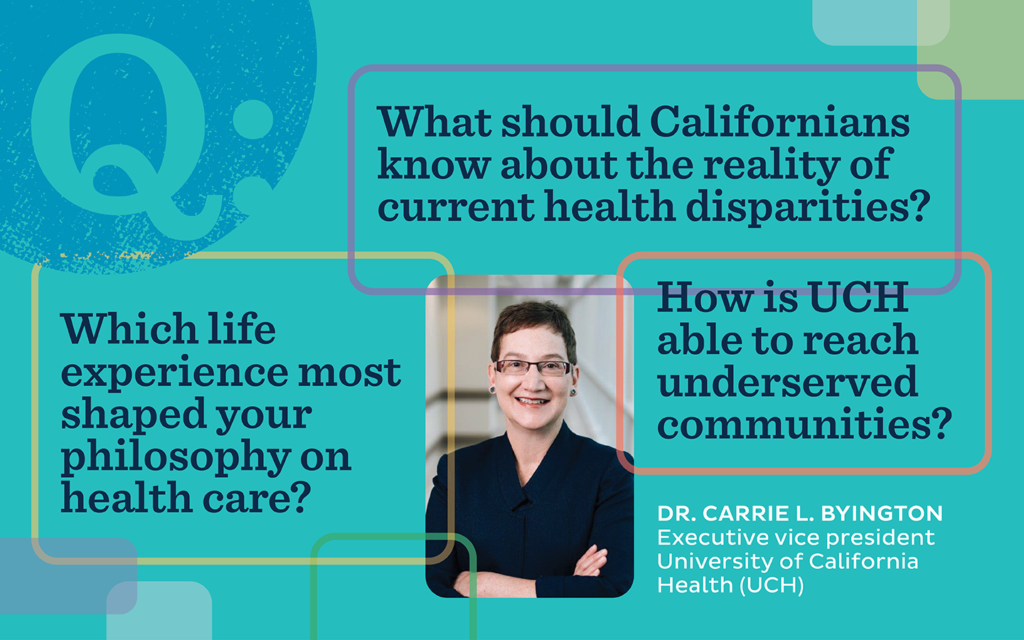OHC sat down with Dr. Carrie L. Byington, executive vice president of University of California Health (UCH), to find out what drew her to California, how preventable differences affect health outcomes, and what the university’s data, expertise, and innovations mean for the Golden State.
Dr. Byington leads one of the country’s largest and most prestigious academic medical systems in the country, which includes six academic health centers and 20 health professional schools. This also includes clinical oversight of University of California‘s student health and counseling centers. She leads the system’s effort to make meaningful changes to improve patient care across the age spectrum and strengthen the training of the health care workforce of the future.

Q: What should Californians know about the reality of current health disparities among various populations?
A: We are fortunate to live in the United States. It is a country, in many ways, that is a role model for the world. Health disparities are related to geography itself (whether someone lives in a rural or urban area). And there are differences between ZIP codes (life expectancy, socioeconomic status, ethnicity, religion, language). I don’t think that these differences should define what health care someone receives. We need to recognize that these disparities exist. In any city, there can be a 20-year difference in life expectancy, and people need to realize this.
Q: In what ways are these health disparities specifically impacting children or vulnerable communities across the state?
A: I became a pediatrician because, during medical school, I realized the importance of children — they are our future. If you can impact their lives early, it will make a huge difference. Children are more vulnerable in their physical and emotional development. We see disparities because the research focuses on adults. I have fought to have children included in medical trials and make sure that they are considered when dealing with pandemics, and not an afterthought.
Q: How is UCH able to reach underserved communities?
A: We have a very strong health professional faculty and teams of staff, trainees, and students at every location that have worked with community partners, sometimes for decades. We had built up trust in many communities in California before the pandemic, and that’s a unique asset.
The other asset that UC brings is the exceptional investigators we employ. These investigators were able to generate and analyze data that could then be used to inform decisions and policymaking to improve the lives of patients in diverse communities.
Q: What comes next in terms of helping California move beyond the pandemic?
A: At this point in the pandemic, we have learned many lessons. There are lessons for us as a statewide, public health system including how to collaborate and use data for making decisions, as well as a renewed commitment to health equity and improving the health of all Californians.
Going forward, I see the UC system playing a bigger role as a partner for the state. We can use our data, our expertise, and innovations to reach more people, improve access, and deliver on the promise of good health.
Q: Which life or career experiences have most shaped your philosophy on health care, especially as it relates to health disparities?
A: I grew up in south Texas, near the border with Mexico. It was a rural area, and I witnessed what I now know are health disparities. It was difficult to see people suffer, or even die, due to lack of medical treatment. These were the formative influences that led me to pursue a career in medicine. I think it is a human right to have access to health care and wanted to work on making it affordable for all.
Q: Tell us a little bit about how you came to UC Health in 2019.
A: I am an academic physician who has spent the majority of my career in Utah. Before coming to UC, I spent time in Texas. I always had an interest in working with underserved populations. Right now, I think we are in a transitional time for health care in the U.S., and I see a lot of opportunity in California. Our state’s leaders are committed to looking at new models to provide quality health care for all Californians, and it seemed like a great opportunity.
Q: How can we better incentivize more health care professionals to work in rural, underserved communities?
A: I believe that a lot of the bridging the gap comes from technology. Many people would love to live in rural areas for the communities that they have — but where they suffer is from the connections, isolation. But with technology, this isolation should not be defining. How can we connect people? How can alumni who live in rural areas be connected? How can we help them maintain their skills through training and other offerings?
Q: What does it mean to be a leading voice in California health care? How are you hoping to reduce health disparities and shape the future of health care overall? How do you define success in your role?
A: I feel a weight of responsibility. It is an enormous privilege, and I want to deliver as much as possible. It means learning more, listening more, being more creative. In the long run, success in this role looks like the health of California. If I am successful in reaching my goals, then the health of California will improve, and the state will be stronger.
